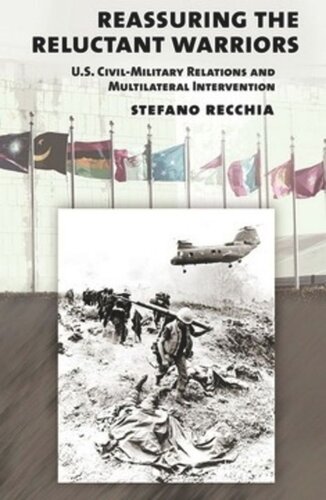

Most ebook files are in PDF format, so you can easily read them using various software such as Foxit Reader or directly on the Google Chrome browser.
Some ebook files are released by publishers in other formats such as .awz, .mobi, .epub, .fb2, etc. You may need to install specific software to read these formats on mobile/PC, such as Calibre.
Please read the tutorial at this link: https://ebookbell.com/faq
We offer FREE conversion to the popular formats you request; however, this may take some time. Therefore, right after payment, please email us, and we will try to provide the service as quickly as possible.
For some exceptional file formats or broken links (if any), please refrain from opening any disputes. Instead, email us first, and we will try to assist within a maximum of 6 hours.
EbookBell Team

4.7
66 reviewsWhy did American leaders work hard to secure multilateral approval from the United Nations or NATO for military interventions in Haiti, the Balkans, and Libya, while making only limited efforts to gain such approval for the 2003 Iraq War? In Reassuring the Reluctant Warriors, Stefano Recchia addresses this important question by drawing on declassified documents and about one hundred interviews with civilian and military leaders.The most assertive, hawkish, and influential civilian leaders, he argues, tend to downplay the costs of intervention, and when confronted with hesitant international partners they often want to bypass multilateral bodies. America's top-level generals, by contrast, are usually "reluctant warriors" who worry that intervention will result in open-ended stabilization missions; consequently, the military craves international burden sharing and values the potential exit ramp for U.S. forces that a handoff to the UN or NATO can provide.Recchia demonstrates that when the military speaks up and clearly expresses its concerns, even strongly pro-intervention civilian leaders can be expected to work hard to secure UN or NATO approval—if only to reassure the military about the likelihood of sustained burden sharing. Conversely, when the military stays silent, as it did in the run-up to the 2003 Iraq War, bellicose civilian leaders are empowered; the United States is then more likely to bypass multilateral bodies, and it may end up carrying a heavy stabilization burden largely by itself. Recchia's argument that the military has the ability to contribute not only to a more prudent but also to a more multilateralist U.S. intervention policy may be counterintuitive, but the evidence is compelling.